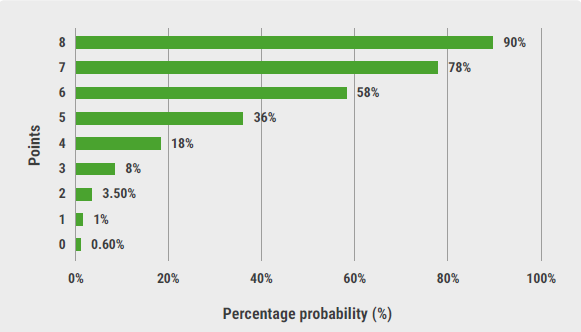The U.S. Preventive Services Task Force (USPSTF) discouraged PSA screening regardless of age in its 2008 and 2012 guidelines. However, these guidelines were updated in 2018 to recommend that men aged 55 to 69 years make an individual decision about whether to be screened after a conversation with their clinician about the potential benefits and harms. The task force recommended against PSA screening in men over 70.
To gauge the impact of these recommendations on prostate-cancer diagnosis, Dr. Vidit Sharma of the University of California, Los Angeles, analyzed age-adjusted incidences of metastatic prostate cancer at diagnosis (per 100,000 men) from the North American Association of Central Cancer Registries from 2002 to 2016 for each U.S. state. They also analyzed data on PSA screening for each state using the Behavioral Risk Factor Surveillance System.
This allowed them to correlate the incidence of metastatic prostate cancer to the proportion of men receiving PSA screening.
On average, the percentage of men age 40 or older who underwent PSA screening decreased from 61.8% in 2008 to 50.5% in 2016, Dr. Sharma reported at the American Society of Clinical Oncology (ASCO) Genitourinary Cancers Symposium.
At the same time, the average number of men diagnosed with metastatic prostate cancer increased from 6.4 to 9 per 100,000 men after adjusting for age, the authors report in their conference abstract.
There was wide variation between states in the percentage of men who reported ever having a PSA screening test (40% to 70%) and in the incidence of metastatic prostate cancer at diagnosis after adjusting for age (range 3.3 to 14.3 per 100,000 men), they point out.
However, statistical modeling showed that reductions over time in PSA screening were associated with increased metastatic prostate cancer diagnoses, and states with larger reductions in PSA screening tended to have larger increases in diagnoses of metastatic prostate cancer, Dr. Sharma said in his presentation.
"Our study strengthens the epidemiologic evidence that reductions in PSA screening may be responsible for at least some of the increase in metastatic prostate cancer diagnosis in the United States and support policies that promote shared decision-making to optimize PSA screening," Dr. Sharma concluded.
In a statement, Dr. Robert Dreicer, ASCO expert in genitourinary cancers, said, "This study suggests that reduced PSA screening may come at the cost of more men presenting with metastatic prostate cancer. Patients should discuss the risks and benefits associated with PSA screening with their doctor to identify the best approach for them."
SOURCE: https://meetings.asco.org/gu/attend ASCO 2021 Genitourinary Cancers Symposium, presented February 8, 2021.
By Megan Brooks
Posted on
Previous Article
« Fecal microbiota transplant in melanoma patients helps anti-PD-1 therapy work Next Article
Smartphones with built-in magnets could inhibit implantable cardiac devices »
« Fecal microbiota transplant in melanoma patients helps anti-PD-1 therapy work Next Article
Smartphones with built-in magnets could inhibit implantable cardiac devices »
© 2024 Medicom Medical Publishers. All rights reserved. Terms and Conditions | Privacy Policy
HEAD OFFICE
Laarderhoogtweg 25
1101 EB Amsterdam
The Netherlands
T: +31 85 4012 560
E: publishers@medicom-publishers.com



